人教版高考英语必修3导学案1.4Unit 1 Festivals around the world学案设计
高中英语Unit1Festivalsaroundtheworld教案新人教版必修3
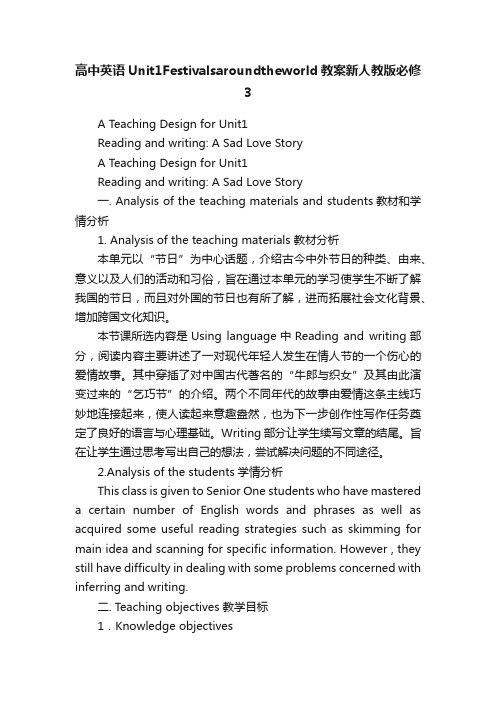
高中英语Unit1Festivalsaroundtheworld教案新人教版必修3A Teaching Design for Unit1Reading and writing: A Sad Love StoryA Teaching Design for Unit1Reading and writing: A Sad Love Story一. Analysis of the teaching materials and students教材和学情分析1. Analysis of the teaching materials 教材分析本单元以“节日”为中心话题,介绍古今中外节日的种类、由来、意义以及人们的活动和习俗,旨在通过本单元的学习使学生不断了解我国的节日,而且对外国的节日也有所了解,进而拓展社会文化背景、增加跨国文化知识。
本节课所选内容是Using language中Reading and writing部分,阅读内容主要讲述了一对现代年轻人发生在情人节的一个伤心的爱情故事。
其中穿插了对中国古代著名的“牛郎与织女”及其由此演变过来的“乞巧节”的介绍。
两个不同年代的故事由爱情这条主线巧妙地连接起来,使人读起来意趣盎然,也为下一步创作性写作任务奠定了良好的语言与心理基础。
Writing部分让学生续写文章的结尾。
旨在让学生通过思考写出自己的想法,尝试解决问题的不同途径。
2.Analysis of the students学情分析This class is given to Senior One students who have mastered a certain number of English words and phrases as well as acquired some useful reading strategies such as skimming for main idea and scanning for specific information. However , they still have difficulty in dealing with some problems concerned with inferring and writing.二. Teaching objectives 教学目标1.Knowledge objectives(1).The students will be able to learn some new vocabulary in the passage: apologize/drown/sadness/obvious/wipe/weave/weep/forgive/t urnup/keep one’s word/hold one’s breath/set off/remind…of.(2).The students will be able to read and understand the story A Sad Love Story. 2.Ability objectives(1). The students will be able to improve their reading abilities and skills likescanning, skimming and writing abilities.(2). The students will be able to guess the meanings of the new words and phrases. 3.Emotional objectives(1)The students’ sense of cross-cultural communication will be greatly aroused. (2)The students’ sense of cooperation will be developed and they will be able to experience the pleasure of cooperation and success.三.Teaching important points and difficult points 教学重点与难点1.Teaching important points 教学重点(1)How to improve the students’ reading abilit ies and skills(2)How to help the students understand different festivals about a love story and how to write a different ending for the story.2.Teaching difficult points 教学难点(1)How to help the students to write the ending for the story.(2)How to help the students learn to use different reading skills四.Teaching practice教学实践1. The idea of my teaching design教学设计思路本节所讲内容是本单元的Reading and writing部分。
新人教版必修三 Unit 1 Festival around the world[教案]
![新人教版必修三 Unit 1 Festival around the world[教案]](https://img.taocdn.com/s3/m/98f4ece4763231126fdb1122.png)
第一单元Reading Festivals and celebrations 教案1. 教学设计理念语言的学习离不开文化,英语教学从某种程度上来讲就是文化教学,对英语文化的了解和理解有利于加深本国文化的学习,培养爱国主义精神,也有利于提高人文素养。
因此传授文化知识、培养文化意识和世界意识,是英语教学中一个非常重要的任务。
①运用任务型语言教学模式,训练培养学生对语言的综合运用能力.②课堂以学生为主体,以任务为主线,重视体验参与,教师起到“设计者、研究者、促进者、协调者〞的作用.③在教学中,突出交际性,注重读写的实用性,要进行情感和策略调整,以形成积极的学习态度,促进语言实际运用能力的提高.④正视个体差异,倡导过程鼓励,以多层次、多角度、多主体的结果与过程并重的评价方式鼓励学生进步.2. 教材分析本单元以节日为话题,介绍古今中外节日的种类、由来、意义以及人们的活动和习俗,旨在通过对世界各地的节日名称、由来及庆祝方式的讨论和学习,让学生在多样的东西方节日、文化中进行比拟,并发现节日文化的共性、多样性和民族独特性,从而增进对多种文化节日的理解,进而拓展社会文化背景、增加跨国文化知识.3. 教学目标①帮助学生了解世界各地的节日.②了解节日的分类并进而理解节日庆祝的意义.③通过阅读材料继续训练学生略读,细读,猜想词义,归纳等阅读技巧.4. 重难点①理解节日的起源及意义,增强文化保护意识②通过学生对多样的东西方节日、文化所进行的比拟,发现节日文化的共性、多样性和民族独特性,从而增进对多种文化节日的理解。
5. 教学步骤Unit 1 Festivals around the worldLearning aims : 1.learn about festivals around the world.2. learn about the kinds of festivals and the reason for celebrating them.3. train reading skills such as skimming and summarizing.Difficult points : the reason for peopke’s celebrating festivalsStep 1 Warming up1.What other traditional festivals in China do you know ?______________________________________________________________2.What festivals of foreign countries do you know?______________________________________________________________ Step 2 ReadingII.Careful reading2). Festivals to Honour People (Match the person with the festival.)1. Qu Y uan a. the Dragon Boat Festival2. Christopher Columbus b. an Indian national festival on Oct. 23. Mohandas Gandhi c. Columbus Day3). Harvest Festivals (Choose the best answer.)Many activities can be held in harvest festivals EXCEPT that people ___.A. get together to have mealsB. decorate houses to admire the moonC. win awards for their farm produceD. enjoy mooncakesTask 2 True or False1. The ancient people needn’t worry about their food.2. Halloween used to be a festival to honor the dead.3. Qu Y uan was a great poet who people honor a lot in China.4. Mid-autumn Festival is held to celebrate the end of autumn.5. Easter celebrates the birth of Jesus.Task 3 Answer the questions1.What are festivals of the dead usually for?2. What makes autumn festivals happy events?3. What do people usually do at spring festivals?4. What is one important reason to have festivals and celebrations?III. Free talkingWhat do most festivals seem to have in common ?Step 3 Discussing◆What is your favourite festival? Why?◆When is it? What is the festival about?◆How long can we have for holiday? What do we usually do in the festival? Step 4HomeworkWrite a short passage about your favorite festival。
人教版高中英语必修三Unit1Festivalsaroundtheworld
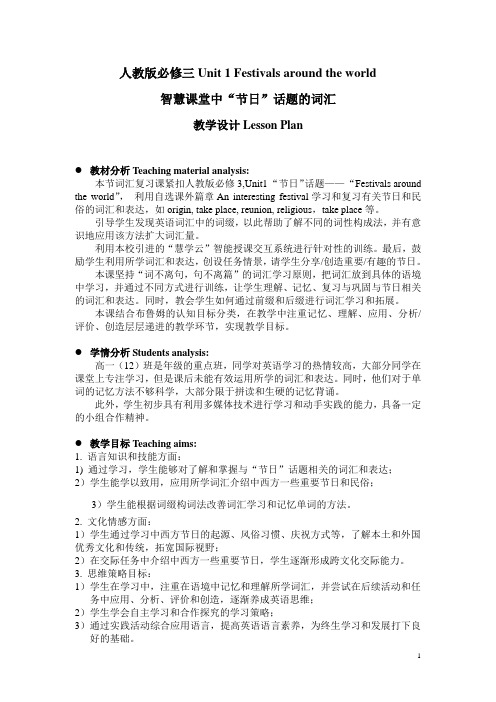
人教版必修三Unit 1 Festivals around the world智慧课堂中“节日”话题的词汇教学设计Lesson Plan●教材分析Teaching material analysis:本节词汇复习课紧扣人教版必修3,Unit1 “节日”话题——“Festivals around the world”,利用自选课外篇章An interesting festival学习和复习有关节日和民俗的词汇和表达,如origin, take place, reunion, religious,take place等。
引导学生发现英语词汇中的词缀,以此帮助了解不同的词性构成法,并有意识地应用该方法扩大词汇量。
利用本校引进的“慧学云”智能授课交互系统进行针对性的训练。
最后,鼓励学生利用所学词汇和表达,创设任务情景,请学生分享/创造重要/有趣的节日。
本课坚持“词不离句,句不离篇”的词汇学习原则,把词汇放到具体的语境中学习,并通过不同方式进行训练,让学生理解、记忆、复习与巩固与节日相关的词汇和表达。
同时,教会学生如何通过前缀和后缀进行词汇学习和拓展。
本课结合布鲁姆的认知目标分类,在教学中注重记忆、理解、应用、分析/评价、创造层层递进的教学环节,实现教学目标。
●学情分析Students analysis:高一(12)班是年级的重点班,同学对英语学习的热情较高,大部分同学在课堂上专注学习,但是课后未能有效运用所学的词汇和表达。
同时,他们对于单词的记忆方法不够科学,大部分限于拼读和生硬的记忆背诵。
此外,学生初步具有利用多媒体技术进行学习和动手实践的能力,具备一定的小组合作精神。
●教学目标Teaching aims:1. 语言知识和技能方面:1) 通过学习,学生能够对了解和掌握与“节日”话题相关的词汇和表达;2)学生能学以致用,应用所学词汇介绍中西方一些重要节日和民俗;3)学生能根据词缀构词法改善词汇学习和记忆单词的方法。
Unit 1 Festivals around the World 教学设计(英语人教版高中必修3)

Unit 1 Festivals around the WorldThe reading passage entitled FESTIV ALS AND CELEBRATIONS briefly describes the origins of different festivals, and then introduces four kinds that are celebrated in most parts of the world. It is important for students to appreciate the values of festivals and learn to attach importance to their culture. Through comparison and contrast, students will be able to evaluate their own culture aswell as exotic culture, keep uptheir own advantages and learn from others, thus cultivating an international outlook.1. Knowledge Objectives:(1)Students know the origins of different festivals.(2)Students learn about history and basic knowledge of festivals both at home and abroad.2. Skill Objectives:(1) Students can practice their reading ability and learn different reading skills.(2) Students can express ideas about festivals and how people celebrate these different festivals.3. Emotional Attitude and Values:(1) Students can get familiar with the origins of festivals both at home and abroad.(2) Students can develop love for their own national culture and customs.(3) Students also can develop the sense of gratitude.4. Learning Strategies:Students can use reading skills to collect and analyze the significant information in the text. They can also work with their partners or work in groups to practice.5. Cross-culture Awareness:Students will cultivate an international outlook through comparison and contrast.Teaching Important Points:1. Students learn more about history and basic knowledge of festivals.2. Students learn different reading skills.Teaching Difficult Points:1. Students enhance their reading ability.2. Students can talk about festivals and celebrations.3. Students will fully understand and keep up the values of festivals.Teaching MethodsElicitation, discussion, listening, group workTeaching AidsA computer, a blackboardStep1 Warming upPlay a guessing game. Try to guess what festival it is.Step2 Fast Reading1.Choose the right main idea for each part.Part1. (Para.1) ___________Part2. (Para.2-5) ___________Part3. (Para.6) ___________A. Different kinds of festivals around the worldB. The reasons why people celebrate the festivalsC. The origins of the festivals2. Fill in the blanksTo day’s festivals have many________:some ________,some ________,some ____________________________.Match the origins with the examples.Step3 Careful Reading1. Festivals of the DeadComplete the table.2. Festivals to Honor PeopleWho are mentioned in this part?3. Harvest Festivals & Spring FestivalsDo a True or False.Only China has mid-autumn festival.Spring festivals are the ones that look forward to the end of winter and to the coming of spring. There are dragon boat race and carnivals at the Spring Festivals in China.4. The Last ParagraphWhy do people celebrate festivals?Step4 ConsolidationThere are all kinds of festivals and ___________ (celebrate) around the world. Some festivals are held to ________ the dead or satisfy the _________(ancestor) in case they might return either to help or to do _______, while other festivals are _______ ( hold ) to honor famous people. Harvest and Thanksgiving festivals are happy events because the food is _________ (gather) for the winter and the __________ (agriculture) work is over. And the most __________ (energy) and important festivals are the ones that look ________ to the end of winter and to the ________ (come) of spring.Step5Language points1.Festivals are meant to celebrate important times of year. mean: 1) 打算,意欲mean+ n/ pron/ to soHe means what he says.He means to cause trouble.2) be meant for“打算给予;打算作……用”。
【人教高一英语】必修三 unit 1 教案
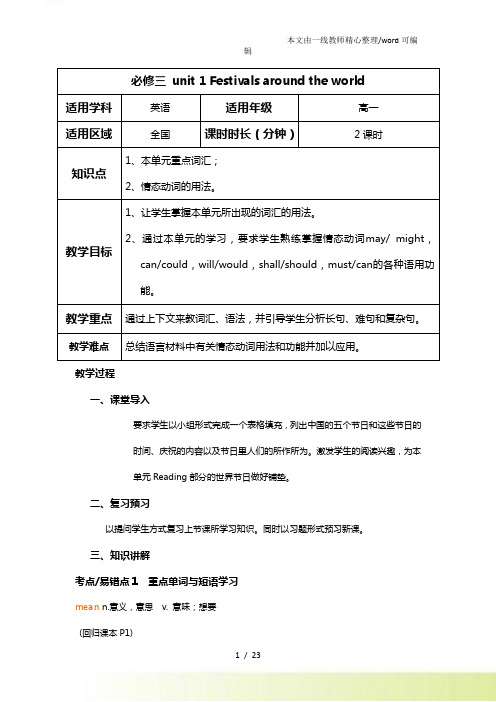
必修三unit 1 Festivals around the world 适用学科英语适用年级高一适用区域全国课时时长(分钟)2课时知识点1、本单元重点词汇;2、情态动词的用法。
教学目标1、让学生掌握本单元所出现的词汇的用法。
2、通过本单元的学习,要求学生熟练掌握情态动词may/ might,can/could,will/would,shall/should,must/can的各种语用功能。
教学重点通过上下文来教词汇、语法,并引导学生分析长句、难句和复杂句。
教学难点总结语言材料中有关情态动词用法和功能并加以应用。
教学过程一、课堂导入要求学生以小组形式完成一个表格填充,列出中国的五个节日和这些节日的时间、庆祝的内容以及节日里人们的所作所为。
激发学生的阅读兴趣,为本单元Reading部分的世界节日做好铺垫。
二、复习预习以提问学生方式复习上节课所学习知识。
同时以习题形式预习新课。
三、知识讲解考点/易错点1 重点单词与短语学习mean n.意义,意思v. 意味;想要(回归课本P1)Festivals are meant to celebrate important times of year.[归纳拓展]mean to do 打算做某事be meant to do 被要求做…mean doing 意味着….eg. I never meant him to work for us.Passing the entrance examination means being admitted into college.take place发生(回归课本P1)Discuss when they take place, what they celebrate and what people do at that time. [归纳拓展] take place/happen/occur/break out/come about(1)take place 其“发生”是按意图或计划进行,无偶然性,无被动语态。
人教版高一英语必修三Unit1Festivals around the world教案设计
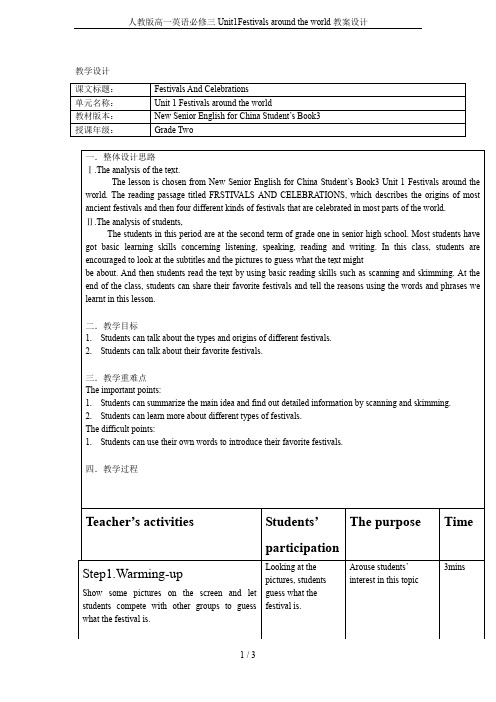
二.教学目标 1. Students can talk about the types and origins of different festivals. 2. Students can talk about their favorite festivals.
三.教学重难点 The important points: 1. Students can summarize the main idea and find out detailed information by scanning and skimming. 2. Students can learn more about different types of festivals. The difficult points: 1. Students can use their own words to introduce their favorite festivals.
人教版高一英语必修三 Unit1Festivals around the world 教案设计
教学设计
课文标题: 单元名称: 教材版本: 授课年级:
Festivals And Celebrations Unit 1 Festivals around the world New Senior English for China Student’s Book3 Grade Two
Step2.Reading
. Ask the students to find out the subtitles, fill in
the blanks and analysis the text.
Students can find
out the subtitles
人教版高中英语必修三Unit1Festivalsaroundtheworld课文知识点解析
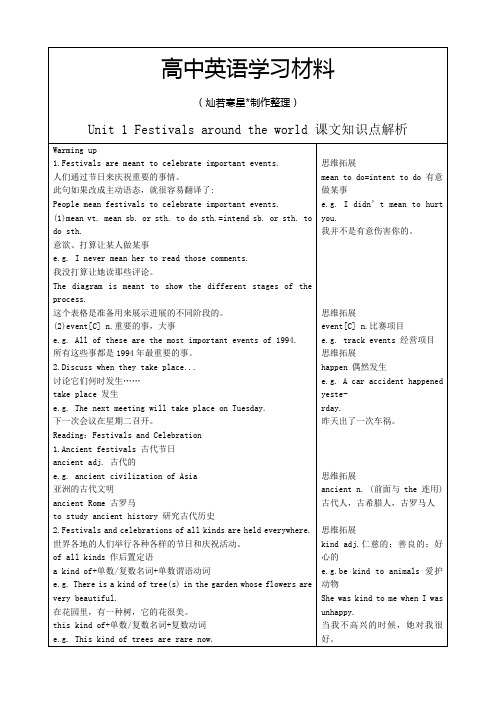
happy memories of his stay in London
对在伦敦幸福的记忆
8.lead the ancestors back to earth
把祖先带回到地球
lead sb. to...把某人带到……
e.g. He led us to his home.
plenty n./pron. 足够;大量
e.g. years of peace and plenty 太平丰收年
There is plenty of room in my bag.
我包里还很空。
6.Some festivals are held to honor the dead,or satisfy and please the ancestors,who could return either to help or do harm.
一些人可能因为他们的动物,花,果实和蔬菜而赢得奖品。
award[C] n. 评价 报酬 奖品
e.g.He has won the best actor award.
他已经获得了最佳男演员奖。
19.In China and Japan there are mid-autumn festivals,when people admire the moon and give gifts of mooncakes.
People mean festivals to celebrate important events.
(1)mean vt. mean sb. or sth. to do sth.=intend sb. or sth. to do sth.
Unit1Festivalsaroundtheworld(新课标版高一英语必修三教案教学设计)

Unit 1 Festivals around the world(新课标版高一英语必修三教案教学设计)Unit 1 Festivals around the worldThe First Period (Warming up & Pre-reading)Step One: Lead-inFree Talk: Did you have a good time in your winter holidays?When did you feel most happy and excited? Why?( At the Spring Festival. Because it's the most important festival in our country....)Step Two: Warming up1. Let the Ss think about the other Chinese festivals.( Lantern Festival, Pure Brightness Festival, Dragon Boat Festival, Mid-Autumn Festival, New Year's Day, Chung Yeung Festival....)2. Discussion One1)Let the Ss look at the information about Chinese festivals and discuss another four Chinese festivals according to the example in warming up: When does the festival come?What do people celebrate?What do people do?Festivals Date festivals DateNew Year January1st Teachers' Day September 10thInternational Women's Day March 8 National Day October 1stArbor Day March 12th The Spring Festival Lunar New Year International labor Day May 1st Dragon Boat Festival the fifth day of the fifth lunar monthInternational Children's Day June 1st Mid-Autumn Festivalthe 15th day of the 8th lunar monthArmy Day August 1st Lantern Festival the 15th day of the 1st lunar monthChinese Youth Day May 4th Pure Brightness Day April the fifth2) Let the Ss fill in the form in the warming up and ask some to share their opinions with the whole class.3 Discussion TwoTalk about some foreign festivals.( Christmas, April Fools Day, Easter Day, Halloween, Valentine's Day, Thanksgiving Day, Obon...)Step three: Pre-readingLet students think about the questions:1) What is your favourate holiday of the year? Why?2)What festivals or celebrations do you enjoy in your city or town? Do you like spending festivals with your family or with friends? What part of a festival do you like best- the music, the things to see, the visits or the food?Step Four: Language Points1.mean to do 打算做某事mean doing 意味着….I never meant him to work for us.Passing the entrance examination means being admitted into college.2. celebrate vt.(1) do sth to show that a day or an event is important 庆祝;祝贺celebrate Christmas / one’s birthday / a wedding anniversary / a victory(2) praise and honor 赞扬;称颂The names of many heroes are celebrated by the poets.词语辨析:celebrate, congratulatecelebrate后常接日期、事情或场合。
- 1、下载文档前请自行甄别文档内容的完整性,平台不提供额外的编辑、内容补充、找答案等附加服务。
- 2、"仅部分预览"的文档,不可在线预览部分如存在完整性等问题,可反馈申请退款(可完整预览的文档不适用该条件!)。
- 3、如文档侵犯您的权益,请联系客服反馈,我们会尽快为您处理(人工客服工作时间:9:00-18:30)。
Unit 1Festivals around the worldPeriod 4语法专题课学习目标1.To master the usage of modal verbs,such as can,may,must,should,shall,etc.2.To learn to use modal verbs in real situations through practice.学习过程Ⅰ.情态动词的定义用来表示说话人的某种感情或语气,对某一动作或状态的看法、态度,即说话人认为某事“可能”“或许”“应该”或是“必须”等意义。
Ⅱ.情态动词的特点(1)情态动词本身不能单独作谓语,其后加动词原形。
(2)情态动词没有人称和数的变化,只用在一般现在时和一般过去时中(have to除外),情态动词的现在式可以表示现在和将来;过去式除了表示过去外,还可用于表示较为委婉的语气,例如:could,would等。
Ⅲ.情态动词can/could,be able to,may/might,will/would,shall/should,must,have to的意义和用法学习建议:根据所列例句,理解并尝试总结情态动词的基本用法。
1.can和could(1)He can speak both English and French.他会说英语和法语。
(2)Could/Can you tell me how to get to the zoo?你能告诉我怎么去动物园吗?(3)Electricity can be dangerous sometimes if used wrongly.用电错误,有时可能会很危险。
(4)Where can/could they have gone?他们可能去哪儿呢?(5)How could you do such a silly thing?你怎么能做这样的傻事?注意:can与be able to的区别(1)No one could/was able to answer the question.没人能回答这个问题。
(2)The fire spread quickly,but everyone was able to escape.火势迅速蔓延,但大家都逃了出来。
can/could所表示的各种含义(1)2.may和might(1)May/Can/Could/Might I have a talk with you?我可以和你谈谈吗?(2)Your maths teacher may/might be in his office.你的数学老师可能在他的办公室。
(3)May you succeed.祝你成功。
(4)You may as well go to see the doctor.你最好去看医生。
may/might所表示的各种含义3.will和would(1)Will you share your happiness with us?你可以把你的快乐与我们共享吗?(2)If you will come to the party,we’ll be very happy.如果你愿意来参加聚会,我们将非常高兴。
(3)He would be nervous when he met strangers.遇见陌生人时,他总是很紧张。
will和would所表示的各种含义(1)(1)Shall I carry it for you?我来帮你搬好吗?(2)He shall have the book when I finish reading.我看完这本书就给他看。
(允诺)(3)You shouldn’t have entered the teachers’ office without permission.未经允许,你们不应该进教师的办公室。
(4)If the car should break down on the way,you would have to walk back.万一汽车中途抛锚,你就得走回来。
shall的用法(1)5.must和have to(1)He has to pass an examination before he can start work.他必须考试及格,才能开始工作。
(2)—Must I return the book today?我今天就要还书吗?—Yes,you must.是的,你必须还。
(—No,you needn’t/don’t have to不,你不必。
)(3)The street is wet.It must have rained last night.街道是湿的,昨晚肯定下过雨。
(4)The machine must break down at this busy hour.正忙的时候机器偏偏坏了。
(1)由前两个例句可知,must 与have to 的区别情态动词记忆口诀:情态动词两要点:动词原形跟后面,说话语气较委婉。
can“能力”may“许可”,must“责任”或“义务”,否定回答“needn’t”换;should“应该”,would“愿”,have to“被迫”表客观。
课后提升挑战一小试牛刀1.I come in and have a talk with you?我可以进来和你谈谈吗?2.(Shall/Will)they wait outside?让他们在外面等吗?3.The boys shouldn’t be (play)football.They should be at school.这些男孩子不应该在踢足球,他们应该在上课。
4.—Must I finish the task?—.(不,你没必要)5.I’m going to Europe on vacation together with John if I find the money.6.—This dish is really delicious.you please say it in Chinese?—Sure,we call it “doufu”.7.If you go,at least wait until the storm is over.8.When you cross the street,you be careful with the passing cars.9.—May I take this seat?—Yes,you .挑战二典题在线1.—Liza well not want to go on the trip.—She hates traveling.A.willB.canC.mustD.may2.—What are you doing this Saturday?—I’m not sure,but I go to the Rolling Stones concert.A.mustB.couldC.shouldD.might3.One of our rules is that every student wear school uniform while at school.A.mightB.couldC.shallD.will4.—you interrupt now?Can’t you see I’m on the phone?—Sorry Sir,but it’s urgent.A.CanB.ShouldC.MustD.Would5.—Can I borrow your car,Mum?—If you .A.mustB.canC.willD.may6.Since nobody gave him any help,he have done the research on his own.A.canB.mustC.wouldD.need7.No one be more generous;he has a heart of gold.A.couldB.mustC.dareD.need8.It be the vocabulary that caused you the problem in the exercise because you know a lot of words.A.mayB.couldn’tC.shouldD.needn’t9.—What’s the name?—Khulaifi.I spell it for you?A.ShallB.WouldC.CanD.Might10.—I think I will give Bob a ring.—You .You haven’t been in touch with him for ages.A.willB.mayC.canD.should课后作业1.Master what you have learned today.2.Correct the mistaken exercises in the paper.参考答案学习过程Ⅲ.1.【归纳总结】(1)表示能力、功能,意为“能,会”。
(2)表示请求、允许、许可。
(3)表示“有时会”。
(4)表示推测。
(5)表示惊异、怀疑、猜测或不相信等态度,主要用于否定句和疑问句中。
(6)当叙述过去经过一番努力才能完成的事情时,只能用be able to。
2.【归纳总结】(1)表示请求、许可,常译为“可以”。
(2)表示推测,可译为“可能,也许”。
may表示推测,一般不用于疑问句中。
一般情况下,might 表示可能性很小。
(3)有时可用于祈使句,表示祝愿(不用might)。
3.【归纳总结】(1)will和would可用于第二人称疑问句,表示请求和建议等。
would比will更委婉、客气。
(2)will和would可表示意志、允诺、愿望和决心,用于各种人称的陈述句中。
(3)will和would可表示某种倾向或习惯性动作。
will表示现在的习惯性动作,would表示过去的习惯性动作。
4.【归纳总结】(1)shall用作情态动词,用于第一、三人称疑问句中,表示说话人征求对方的意见或请求。
(2)shall用于第二、三人称陈述句中,表示说话人的意愿,有允诺、警告、命令、决心、强制等意思。
通常译为“必须”“应该”或“可以”。
(3)表示对现在或以前的动作的责怪、批评(不应该做的事却做了)。
(4)表示语气较强的假设(用于对将来情况的假设),意为“万一”。
5.【归纳总结】(1)must用于表示说话人的主观看法,“必须”或“应当”。
have to用于表示客观情况“不得不”。
(2)在回答由must提出的问题时,肯定回答用must,否定回答用needn’t或don’t have to。
